|
All Officials Moons of Jupiter, Saturn, Uranus and Neptune
|
|
| astronomy_lover | Date: Friday, 04.01.2013, 19:15 | Message # 1 |
|
Observer
Group: Users
 Italy
Italy
Messages: 14
Status: Offline
| After I worked very very hard (I must to do all calculations manually...and this fires the eyes  ) )
I manage to create the definitive file "SmallMoons". This file contains the moons of Jupiter, Saturn, Uranus and Neptune that are missing in Space Engine, and the official names, decided by Nasa, for the moons which had the provisional name (for example 2003 J8 that is moon Hegemone of Jupiter).
I have attached, also, an excel file where there are the explications of planets and moons.
Above I had post a thread in the section "Troubleshooting and Solutions" of this forum for ask help to others members but because nobody answer me for help me, I decided to work very very hard and I obtained my result 
I hope that this work is appreciated to all members of forum 
Bye and thanks.
|
| |
| |
| Tim | Date: Friday, 04.01.2013, 19:44 | Message # 2 |
 Explorer
Group: Users
 Belgium
Belgium
Messages: 296
Status: Offline
| They're all there. Kudo's to you sir.
Edited by Tim - Friday, 04.01.2013, 20:15 |
| |
| |
| astronomy_lover | Date: Friday, 04.01.2013, 21:17 | Message # 3 |
|
Observer
Group: Users
 Italy
Italy
Messages: 14
Status: Offline
| Tim,
Thank's...very thank's...
Space Engine is a very good and realistic simulator but the situation, that many satellites, of the most important planet like jupiter o saturn, are missing, reducing the value of the program. That' why I decide to modify the file "SmallMoons" of the program.
I remember to all people who read this thread that the file "SmallMoons" must to place in the folder named "planets".
Bye and still thank's.
Edited by astronomy_lover - Friday, 04.01.2013, 21:27 |
| |
| |
| Antza2 | Date: Friday, 04.01.2013, 21:55 | Message # 4 |
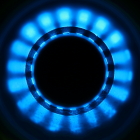 World Builder
Group: Global Moderators
 Finland
Finland
Messages: 1049
Status: Offline
| SpaceEngineer should consider integrating this mod into SE, assuming that it contains all the correct satellites at their correct orbits. ( I haven't had the time to test it out yet.)
Go to antza2.deviantart.com for cool photos!
|
| |
| |
| astronomy_lover | Date: Saturday, 05.01.2013, 00:53 | Message # 5 |
|
Observer
Group: Users
 Italy
Italy
Messages: 14
Status: Offline
| Antza2,
Dear Antza 2 that which you say is a great honour and thanks for me: this make me very happy 
About the reliability of datas (radius, semi-major axis, period, eccentricity and inclination, ecc.) I utilise the following sites:
http://nssdc.gsfc.nasa.gov/planetary/
http://nssdc.gsfc.nasa.gov/planetary/factsheet/joviansatfact.html
http://nssdc.gsfc.nasa.gov/planetary/factsheet/saturniansatfact.html
http://nssdc.gsfc.nasa.gov/planetary/factsheet/uraniansatfact.html
http://solarsystem.nasa.gov/planets....ay=Sats
http://solarsystem.nasa.gov/planets....ay=Sats
http://solarsystem.nasa.gov/planets....ay=Sats
http://it.wikipedia.org/wiki/Satelliti_naturali_di_Giove
http://it.wikipedia.org/wiki/Satelliti_naturali_di_Saturno
http://it.wikipedia.org/wiki/Satelliti_naturali_di_Urano
But, with my great wonder, I realized that existing many differences between the nasa's sites themselves, as you can to see by the images that I attached to this post. There are differences even between the two sites nasa and wikipedia, but we say that wikipedia is free from variously people, and for this it's not very credible.
Therefore I had to decide and in many cases I have utilised the data of solar system nasa site.
About the rotation period, rotationoffset, ascending node, arg of pericen and mean anomaly, I have utilised the datas of the program Celestia; and this because I don't say how to calculate these datas. I have attached, to this post, also the two files of Celestia program, as you can check: they are "Minormoons" and "Numberedmoons".
Instead, when I didn't even thesee datas (ascending node, ecc.) I did not put nothing (for example for the 4 satellites of Jupiter, which are discover in 2010 and 2011). I have put only eccentricity, inclination, period and semi-major axis.
However I think that also Nasa itself have many many doubts of the reals parameters of these moons and therefore I think that the work that I did is very close to reality.
I thank you from the heart for the honor you have given me and I wish you a good evening 
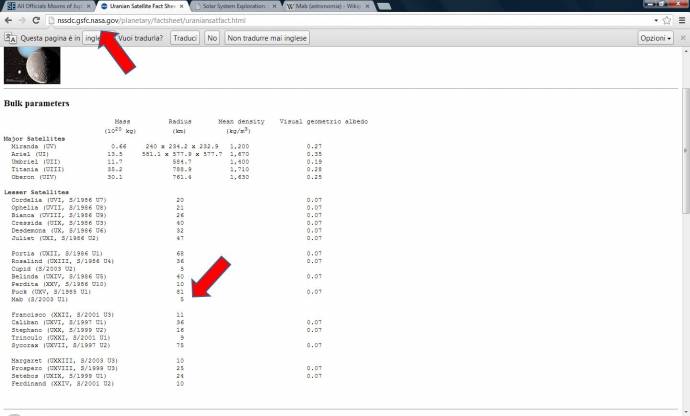
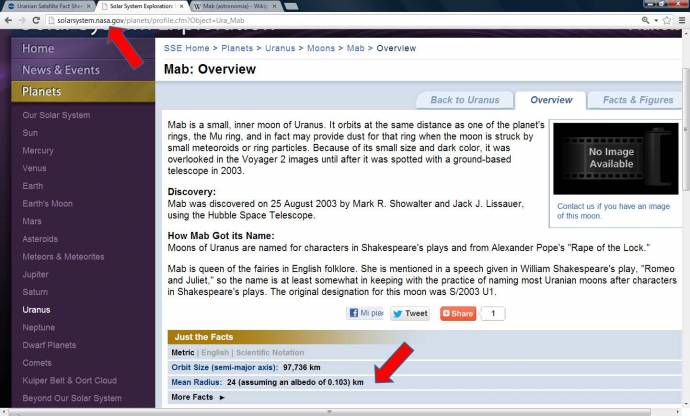
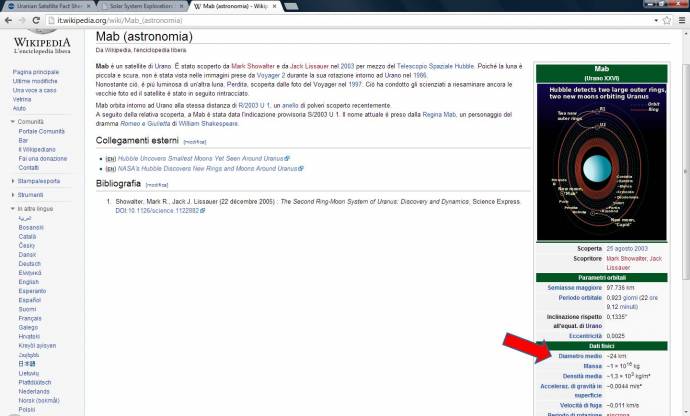 Added (05.01.2013, 03:53)
---------------------------------------------
(Antza2) You've met with a terrible fate, haven't you?
Sorry...I don't read this phrase...
Yes, it was very hard...and I have my eyes that burn  .... but I'm very proud of myself .... but I'm very proud of myself  ....thanks a lot .... ....thanks a lot ....
|
| |
| |
| HarbingerDawn | Date: Saturday, 05.01.2013, 01:42 | Message # 6 |
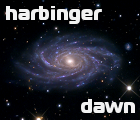 Cosmic Curator
Group: Administrators
 United States
United States
Messages: 8717
Status: Offline
| (astronomy_lover) the official names, decided by Nasa
Even though I hate the IAU, shouldn't we only use the IAU names for objects and not names assigned by other agencies?
(astronomy_lover) wikipedia is free from variously people, and for this it's not very credible.
On matters of this sort, the English Wikipedia is very reliable. I cannot speak for the Italian Wikipedia, but in general it has been my observation that the English Wiki has superior quality to most of the others (at least on scientific subjects). Anyway, a well-written Wiki article will cite its sources for all information so that you can verify it.
(astronomy_lover) rotation period, rotationoffset
For satellites where this is not known, you can leave them out of the catalog and SE will make them for you.
(astronomy_lover)
(Antza2)
You've met with a terrible fate, haven't you? Sorry...I don't read this phrase...
He was not saying that to you, that's his forum signature 
All forum users, please read this!
My SE mods and addons
Phenom II X6 1090T 3.2 GHz, 16 GB DDR3 RAM, GTX 970 3584 MB VRAM
|
| |
| |
| DoctorOfSpace | Date: Saturday, 05.01.2013, 03:18 | Message # 7 |
 Galaxy Architect
Group: Global Moderators
 Pirate
Pirate
Messages: 3600
Status: Offline
| (HarbingerDawn) Even though I hate the IAU, shouldn't we only use the IAU names for objects and not names assigned by other agencies?
That would simplify things and be very nice.
Anything that adds more to SE is welcome.  Nice job. Nice job.
Intel Core i7-5820K 4.2GHz 6-Core Processor
G.Skill Ripjaws V Series 32GB (4 x 8GB) DDR4-2400 Memory
EVGA GTX 980 Ti SC 6GB
|
| |
| |
|
| Tim | Date: Saturday, 05.01.2013, 15:14 | Message # 9 |
 Explorer
Group: Users
 Belgium
Belgium
Messages: 296
Status: Offline
| As for Wikipedia, I have often had the discussion with people at school that Wikipedia really is more reliable than most people think.
However, when it comes to variable numbers, like populations in a certain year etc. I've often noticed differences in multiple related articles or in the Dutch translations.
|
| |
| |
| astronomy_lover | Date: Saturday, 05.01.2013, 15:39 | Message # 10 |
|
Observer
Group: Users
 Italy
Italy
Messages: 14
Status: Offline
| Tim,
Yes, it's true...I agree with that you say...
the problem, of parameters of moons, concern dates that are subject to variations by differents sources.....
and it became very very difficult to establish a date with extreme precision and in an absolute way...
|
| |
| |
| jtmedina | Date: Saturday, 05.01.2013, 21:33 | Message # 11 |
|
Space Pilot
Group: Users
 Spain
Spain
Messages: 100
Status: Offline
| Excellent!. Good work!. Agree this mod should be part of Space Engine.
|
| |
| |
| astronomy_lover | Date: Sunday, 06.01.2013, 01:51 | Message # 12 |
|
Observer
Group: Users
 Italy
Italy
Messages: 14
Status: Offline
| (jtmedina) Excellent!. Good work!. Agree this mod should be part of Space Engine.
Thank's Jtmedina, even you are very very gentle.
Yours congratulations are for me the payment for the fatigue that I did 
Bye...
|
| |
| |